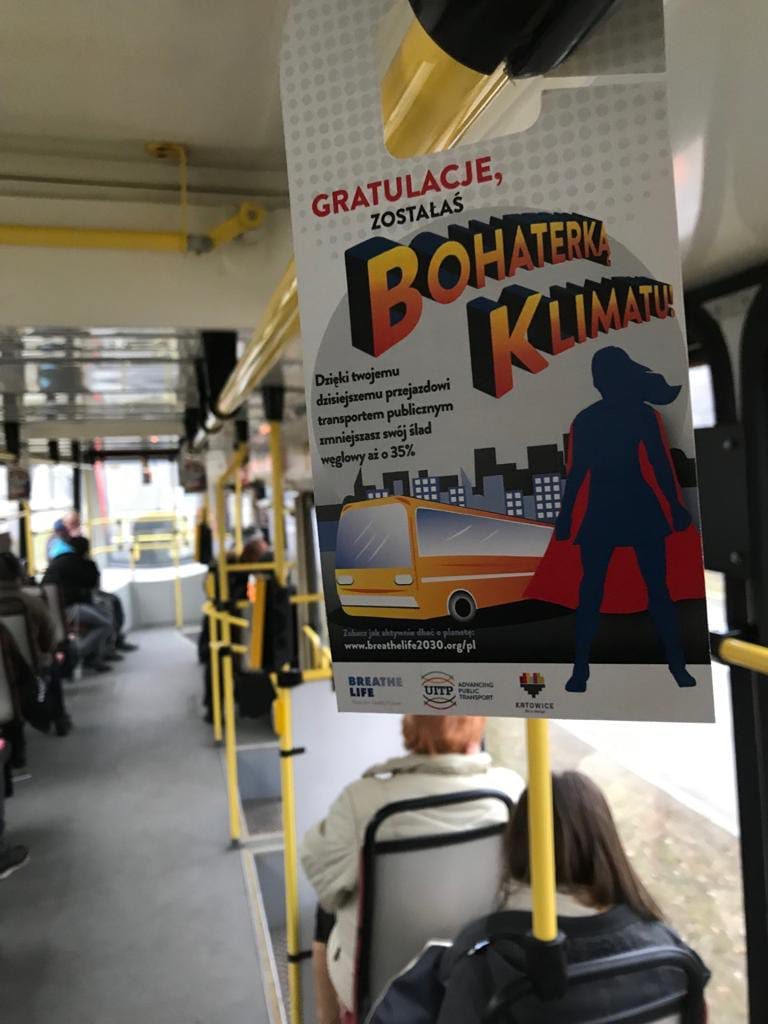“Congratulations, you’re a climate hero!”
Commuters in the city of Katowice, Poland, the hosts of this year’s UN Climate Change Conference (COP), currently in session, are greeted on their daily bus and tram travels by bright hanging cards praising commuters for their choice of transportation.

UITP, Climate and Clean Air Coalition and the City of Katowice launched a public awareness campaign to draw attention to transport issues in climate action and to show appreciation for commuters choosing public transport.
The brainchild of the International Association of Public Transport (UITP), the Climate and Clean Air Coalition and the City of Katowice, the cards are intended to raise awareness among both the city’s locals and the thousands of international delegates to the conference of the important role public transport plays in climate action, public health and advancing urban mobility.
“Everyone has to use the transport network here, and everyone can relate to it because they have to travel to come to the COP venue, so this is why we did this campaign,” said UITP’s Sustainable Development Manager & EU expert Sustainable Mobility, Philip Turner, in a Facebook Live interview.
“We thought it would be a really good opportunity to link the climate and air quality issues, which the BreatheLife campaign does, and we also thought that the COP is an ideal opportunity because you’ve got thousands of people in a city in a short space of time, covering all the different sectors, as well as locals… asking themselves, ‘how can I relate to the climate talks?’” he said.
That link was also drawn by two major reports on health and climate change— one by the Lancet Climate Countdown and one led by the World Health Organization— released just before and during the COP, which drew attention to the health and climate co-benefits of increasing non-motorized transport and putting in place well-planned public transport systems.
The campaign fronts a deeper discussion into the importance of decarbonizing transport systems to meeting both the Paris Agreement goals and reaping public health gains in an increasingly carbon-constrained, urbanized and populated world.
Last week’s Transport Day at COP highlighted the crucial role of cities in reducing greenhouse gas emissions and improving air quality by putting in place measures in the transport sector– and cities around the world have certainly begun taking steps to change how their citizens move.
For example, BreatheLife city Santiago, Chile, has rolled out its first 100 electric buses as part of a strategy whose goal is to have in place a 100 per cent electric public transportation system by 2050.
Another example: Oslo and neighbouring Akershus county aims to power all their public transport exclusively by renewable energy by 2020; as it stands, electric vehicles have contributed to a 35 per cent decrease in carbon dioxide emissions in the city since 2012, improving air quality and public health.
In a Facebook Live interview, UITP’s Phillip Turner also gave the example of London, one of BreatheLife’s pioneer cities.
“In London, there is a company that goes around and collects used coffee grounds, which it turns into fuel that goes into buses,” he continued.
Meanwhile, the New Delhi metro, he said, “are installing solar power across the entire network; 15 per cent of their energy demand is met through solar, and that is a model that is going to be scaled up nationally.”
The transportation sector has seen faster emissions growth than any other over the last 50 years. Transport is responsible for 23 per cent of global energy-related carbon emissions and is a major source of air pollution.
Research from C40 Cities shows that improving public transport could prevent the premature deaths of nearly one million people per year from air pollution and traffic fatalities worldwide.
Read the UITP press release here: BUILDING ON OUR COLLABORATION: THE UNFCCC, UITP AND UIC REPARTNER FOR COP24
Watch the Facebook Live interview here.